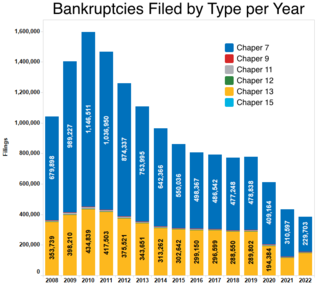Related Research Articles
Bankruptcy is a legal process through which people or other entities who cannot repay debts to creditors may seek relief from some or all of their debts. In most jurisdictions, bankruptcy is imposed by a court order, often initiated by the debtor.
Chapter 11 of the United States Bankruptcy Code permits reorganization under the bankruptcy laws of the United States. Such reorganization, known as Chapter 11 bankruptcy, is available to every business, whether organized as a corporation, partnership or sole proprietorship, and to individuals, although it is most prominently used by corporate entities. In contrast, Chapter 7 governs the process of a liquidation bankruptcy, though liquidation may also occur under Chapter 11; while Chapter 13 provides a reorganization process for the majority of private individuals.
In law, a judgment, also spelled judgement, is a decision of a court regarding the rights and liabilities of parties in a legal action or proceeding. Judgments also generally provide the court's explanation of why it has chosen to make a particular court order.
A creditor or lender is a party that has a claim on the services of a second party. It is a person or institution to whom money is owed. The first party, in general, has provided some property or service to the second party under the assumption that the second party will return an equivalent property and service. The second party is frequently called a debtor or borrower. The first party is called the creditor, which is the lender of property, service, or money.

In contract law, force majeure is a common clause in contracts which essentially frees both parties from liability or obligation when an extraordinary event or circumstance beyond the control of the parties, such as a war, strike, riot, crime, epidemic, or sudden legal change prevents one or both parties from fulfilling their obligations under the contract. Explicitly excluded is any event described as an act of God, which covers a separate domain and legally differs, though it is related to contract law. In practice, most force majeure clauses do not entirely excuse a party's non-performance but suspend it for the duration of the force majeure.

A debtors' prison is a prison for people who are unable to pay debt. Until the mid-19th century, debtors' prisons were a common way to deal with unpaid debt in Western Europe. Destitute people who were unable to pay a court-ordered judgment would be incarcerated in these prisons until they had worked off their debt via labour or secured outside funds to pay the balance. The product of their labour went towards both the costs of their incarceration and their accrued debt. Increasing access and lenience throughout the history of bankruptcy law have made prison terms for unaggravated indigence obsolete over most of the world.

In the United States, bankruptcy is largely governed by federal law, commonly referred to as the "Bankruptcy Code" ("Code"). The United States Constitution authorizes Congress to enact "uniform Laws on the subject of Bankruptcies throughout the United States". Congress has exercised this authority several times since 1801, including through adoption of the Bankruptcy Reform Act of 1978, as amended, codified in Title 11 of the United States Code and the Bankruptcy Abuse Prevention and Consumer Protection Act of 2005 (BAPCPA).

Distraint or distress is "the seizure of someone’s property in order to obtain payment of rent or other money owed", especially in common law countries. Distraint is the act or process "whereby a person, traditionally even without prior court approval, seizes the personal property of another located upon the distrainor's land in satisfaction of a claim, as a pledge for performance of a duty, or in reparation of an injury." Distraint typically involves the seizure of goods (chattels) belonging to the tenant by the landlord to sell the goods for the payment of the rent. In the past, distress was often carried out without court approval. Today, some kind of court action is usually required, the main exception being certain tax authorities – such as HM Revenue and Customs in the United Kingdom and the Internal Revenue Service in the United States – and other agencies that retain the legal power to levy assets without a court order.
A guarantee is a form of transaction in which one person, to obtain some trust, confidence or credit for another, engages to be answerable for them. It may also designate a treaty through which claims, rights or possessions are secured. It is to be differentiated from the colloquial "personal guarantee" in that a guarantee is a legal concept which produces an economic effect. A personal guarantee by contrast is often used to refer to a promise made by an individual which is supported by, or assured through, the word of the individual. In the same way, a guarantee produces a legal effect wherein one party affirms the promise of another by promising to themselves pay if default occurs.

Debt collection is the process of pursuing payments of money or other agreed-upon value owed to a creditor. The debtors may be by individuals or businesses. An organization that specializes in debt collection is known as a collection agency or debt collector. Most collection agencies operate as agents of creditors and collect debts for a fee or percentage of the total amount owed. Historically, debtors could face debt slavery, debtor's prison, or coercive collection methods. In the 21st century in many countries, legislation regulates debt collectors, and limits harassment and practices deemed unfair.
Confession of judgment is a legal term that refers to a type of contract in which a party agrees to let the other party enter a judgment against them. Such contracts are highly controversial and may be invalidated as a violation of due process by courts, since the obligor is essentially contracting away his right to raise any legitimate defenses.

In finance, a security interest is a legal right granted by a debtor to a creditor over the debtor's property which enables the creditor to have recourse to the property if the debtor defaults in making payment or otherwise performing the secured obligations. One of the most common examples of a security interest is a mortgage: a person borrows money from the bank to buy a house, and they grant a mortgage over the house so that if they default in repaying the loan, the bank can sell the house and apply the proceeds to the outstanding loan.
The history of Roman law can be divided into three systems of procedure: that of legis actiones, the formulary system, and cognitio extra ordinem. Though the periods in which these systems were in use overlapped one another and did not have definitive breaks, the legis actio system prevailed from the time of the XII Tables until about the end of the 2nd century BC, the formulary procedure was primarily used from the last century of the Republic until the end of the classical period, and cognitio extra ordinem was in use in post-classical times.
Attachment is a legal process by which a court of law, at the request of a creditor, designates specific property owned by the debtor to be transferred to the creditor, or sold for the benefit of the creditor. A wide variety of legal mechanisms are employed by debtors to prevent the attachment of their assets.

Diligence is a term in Scots Law with no single definition, but is commonly used to describe debt collection and debt recovery proceedings against a debtor by a creditor in Scottish courts. The law of diligence is part of the law of actions in Scots private law. Accordingly, it is within the devolved competence of the Scottish Parliament.
Bankruptcy in Irish Law is a legal process, supervised by the High Court whereby the assets of a personal debtor are realised and distributed amongst his or her creditors in cases where the debtor is unable or unwilling to pay his debts.

Mann v Goldstein [1968] 1 WLR 1091 is a UK insolvency law case concerning the bringing of a winding up petition when a company is alleged to be unable to repay its debts.
In law, an appeal is the process in which cases are reviewed by a higher authority, where parties request a formal change to an official decision. Appeals function both as a process for error correction as well as a process of clarifying and interpreting law. Although appellate courts have existed for thousands of years, common law countries did not incorporate an affirmative right to appeal into their jurisprudence until the 19th century.

Cayman Islands bankruptcy law is principally codified in five statutes and statutory instruments:

Debtors' Prison Relief Act of 1792 was a United States federal statute enacted into law by the first President of the United States George Washington on May 5, 1792. The Act of Congress established penal regulations and restrictions for persons jailed for property debt, tax evasion, and tax resistance. The indebtedness penalty was governed as a forbidding act for citizens indebted to colonial provinces. The public law granted a sunset provision limiting the term of the federal statute for the colonial domains.
References
- ↑ M.G.L. Ch. 224, s. 14 https://malegislature.gov/Laws/GeneralLaws/PartIII/TitleII/Chapter224/Section14